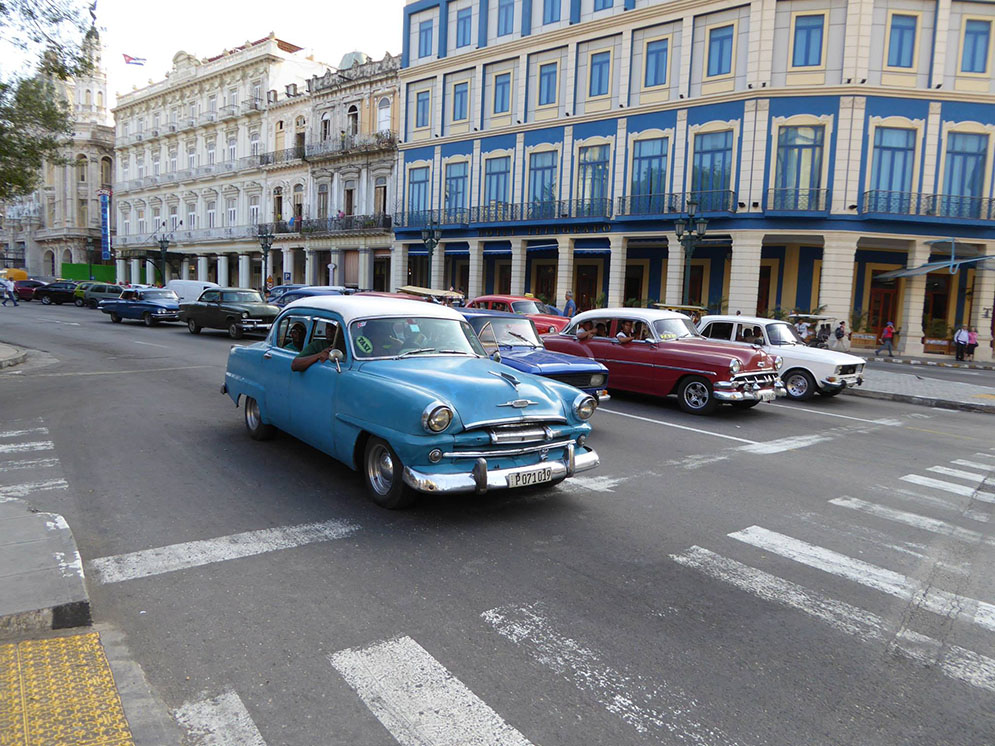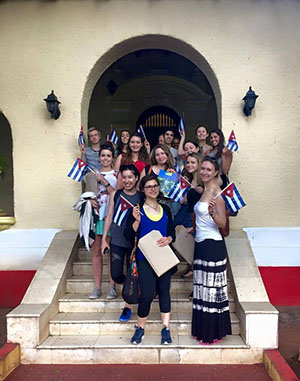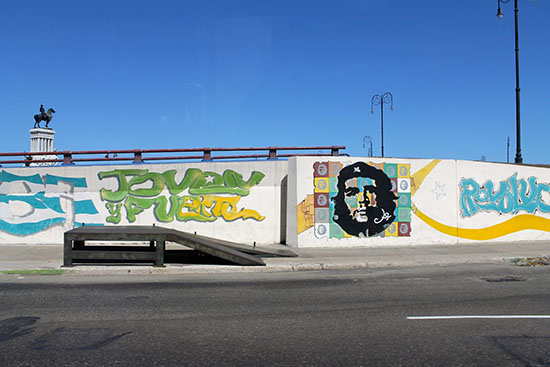CAS Course Brings Students to Cuba
BU group among first to visit after travel restrictions eased

Vintage cars from the 1950s and 1960s are popular in Cuba, since Fidel Castro made it illegal for Cubans to import cars without government permission. Photo by Danica Drezner (CAS’17)
For 13 BU students, this month’s spring break week offered an unforgettable experience: a chance to visit Cuba at a crucial moment in the island’s history. In December, President Obama announced the resumption of full diplomatic relations with the Communist country and the easing of travel restrictions, signaling a thawing in a decades-long political stalemate. (A trade embargo remains in place.)
The students enrolled in the one-credit College of Arts & Sciences course Experiencing Cuba: History, Culture, and Politics traveled to Cuba for a week, accompanied by several faculty members. There they went to lectures, took guided tours, and visited with a US diplomat who works in the area. They also had a chance to immerse themselves in Cuban culture, attending performances by flamenco dancers and local musicians and even taking in a baseball game. They will write a paper about their experience as a final part of the course.

Trip coleader John Thornton, a CAS professor of African American studies and of history and director of the African American Studies program, says the trip—three years in the planning—couldn’t have come at a better time, citing the fact that the two countries are in the midst of a historic moment. “The students were able to witness what we think will be the beginning of a set of transitions in Cuba,” he says. “We wanted them to see the contrast between how the ruling group in Cuba views this situation and then the way others view it.”
Since Fidel Castro’s ascension to power in 1959, more than a half-century ago, relations between the United States and Cuba had been marked by wariness and hostility. The United States–led Bay of Pigs debacle failed to oust Castro in 1961, and the Cuban Missile Crisis a year later brought the world to the brink of nuclear war. In the intervening decades, it was nearly impossible for Americans to travel to Cuba: those who did go had to clear their trip with a government agency, apply for a special license, or go on a company-organized “people to people” exchange. Now, licenses are given for cases such as public performances and human rights work. (The BU group traveled on an educational mission.) With the restoration of diplomatic relations, Congress could eventually decide to lift all travel restrictions.
When Thornton and coleader Linda Heywood, a CAS professor of African American studies, began planning the course, they expected to have to contend with the onerous travel restrictions. The new deal between the two countries made travel much easier, Heywood says. Also leading the trip were Ana-María Reyes, a CAS assistant professor of Latin American art, and Amanda Thornton, an infectious diseases fellow at Boston Medical Center.
Art history major Jemma Douglas (CAS’16) says she jumped at the chance to see Cuba’s vibrant murals and contemporary sculptures in person. But she was taken aback by a something she saw on the way to her hotel.

“We were on the bus and saw a billboard with a famous Castro quote that translates to ‘The socialist revolution—of the working people, with the working people, and for the working people,’” she says. “It was a reminder that we would be visiting a country with socialist ideals.”
During their weeklong visit, the BU group was scheduled to spend one day meeting with Cuban college students. The students, says Thornton, turned out to be members of Cuba’s Young Communist League. “It was a structured, formal presentation by a group of highly disciplined youth who were kept in line by their leader, who controlled when they spoke and how they spoke, and wouldn’t let them speak in English, although one of them appeared to be fluent,” Thornton says. “They took the party line, which is that the US trade embargo is responsible for all the ills and all that ails Cuban society. There are a number of set things that the United States is blamed for, including a false claim that US doctors weaponized dengue fever.”
On another day, a local professor met with the group to talk about some of the infrastructure challenges facing Cuba; he estimated that only 15 percent of Cubans currently have internet access and expressed his belief that the current embargo prevented Cuba from growing. He hoped Cuba could soon begin to engage with American businesses, Heywood says, “because it will stimulate economic development.”
While poverty is rampant and free speech limited in the country, she says, medical care and education are free. “I asked Cubans what they would like to retain when Cuba changes, and those were the things they wanted to keep,” she says. “Cubans’ life expectancy is very high, and it’s like a first world country in terms of education and health.”
Heywood wanted BU students to visit Cuba in part so they could experience the country’s intermingled culture. “What surprised me when I visited Cuba for the first time was that when walking down the street, you see groups of family members or friends who are a range of colors,” she says. “In many American neighborhoods you don’t see that kind of mixture. Cubans stress their ability to be inclusive. I thought it would be a good idea for students to see a society where the races seem to intermingle in social ways.”
Paramount for the trip, though, was the rare opportunity it gave students to better understand a nation straddling the line between the past and future. Demetri Markantonis (CAS’16) saw the course as a once-in-a-lifetime chance to see Cuba before the many changes expected there as the United States relaxes banking and travel restrictions.
“With the changes that we foresee developing, the continuation of the embargo, and the Cuban people pursuing some modernization, Cuba will definitely change,” Markantonis says. “A lot of things that have been preserved culturally will probably fade away: you’ll get newer buildings, for instance. So I fear that loss, but since it will come with an improved standard of living, I want the best for them.”

Comments & Discussion
Boston University moderates comments to facilitate an informed, substantive, civil conversation. Abusive, profane, self-promotional, misleading, incoherent or off-topic comments will be rejected. Moderators are staffed during regular business hours (EST) and can only accept comments written in English. Statistics or facts must include a citation or a link to the citation.